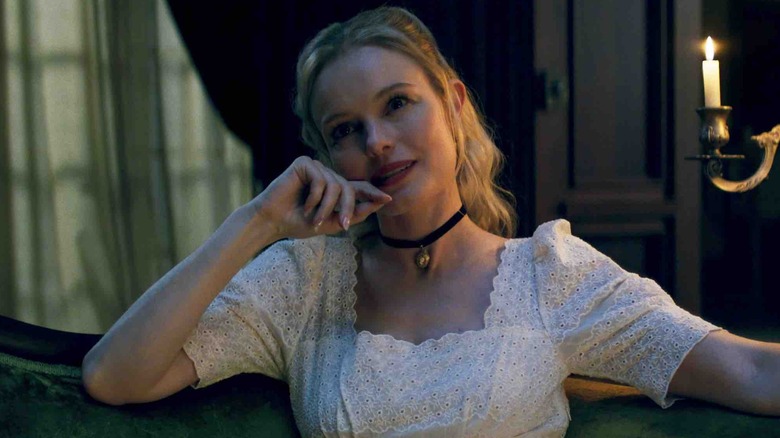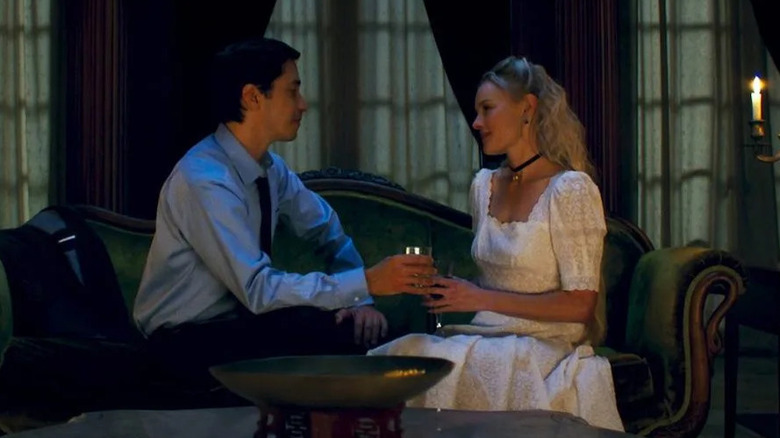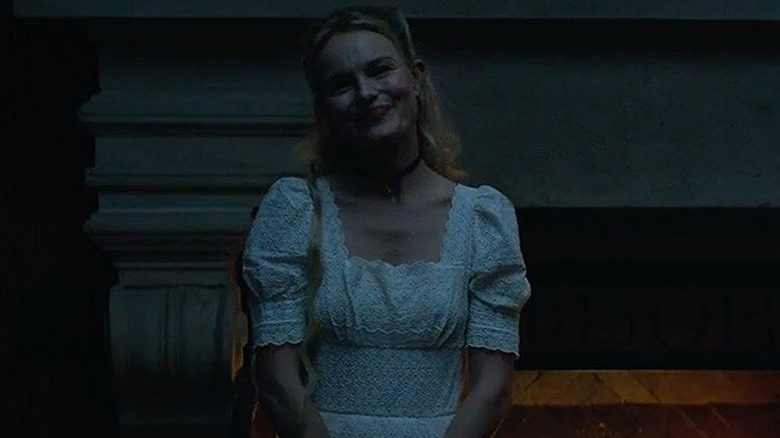House Of Darkness Review: An Ably Performed, But Largely Toothless Vampire Yarn
The modern dating scene can be murder. You meet someone at an event, a club, a bar ... you never know if you're seeing the real them. You likely aren't. What's lying underneath the surface of your boozed-up interlocutor? Are they kind? Better than you're seeing? Or more likely, are they worse? And for women meeting men, the latter's undoubtedly a frightening potential outcome. "House of Darkness" centers itself entirely around an ironic subversion of that fearful commonplace situation. Here, a man drives a woman home from a bar to her isolated mansion and finds himself beset by powerful women, the womanizer becoming the hunted late-night target.
While horror fans may better know writer-director-playwright Neil LaBute for his ill-fated "The Wicker Man" remake, relationship games, power, and their consequences are frequent themes of his wider oeuvre. "House of Darkness" fits well within that vein, but here with a twist inspired by Dracula's long-fabled brides. There's quite a bit that does work about "House of Darkness," including a strong central cast giving nuanced performances, some strong moments of dialogue, and a well-developed eerie tone. At the same time, the film is beset with a host of missed opportunities ... it's a dialogue-heavy homage to the world and brides of Dracula that features the horrors of their vampiric glory shockingly little. Intriguing character work notwithstanding, it's a vampire yarn that may well leave a sour taste in a horror lover's mouth where a bloody one should be.
Predatory turnabout is fair play when the Brides are out
In "House of Darkness," we meet Hap Jackson (Justin Long) and Mina Murray (Kate Bosworth) en route to the latter's isolated home after a late night of drinks. The pair met at a bar, and it's clear from moment one that there's a dynamic at play that persists for much of the film. Hap feigns chivalrous civility, a façade pasted over an evident desire to bed a beautiful woman. He seems the type to pursue any such woman he found beautiful, but on this night he and the mysterious Mina end up fateful traveling companions. Long lands the role of a charismatic womanizer whose misogyny comes out in subtle moments, immediately excused away by a man who wants to sell a different version of himself.
As much as Hap insists on being cloaked in his own virtue, Mina seemingly exists to pull away at the loose threads of that cloak, rendering him bare. Bosworth plays the character with a hard-to-pin but tactical aloofness, showcasing a Mina who knows what she wants but keeps her motives guarded. Mina's sport here is toying with Hap to reveal the limits of the narratives he tells about himself, a back-and-forth that continues as the pair exit the car and enter the intermittently dark country mansion. The odd courtship is interrupted by subtly creepy moments as Hap hears a sound, gets spooked by odd sounds, or sees a lurking figure in the dark. When things seem to be going the way he always seemed to intend, the romantic interlude is interrupted by Mina's blunt but seemingly earnest sister Lucy (Gia Crovatin), who (of course) Hap eventually comes to flirt with.
The film pivots into a series of unsettling interactions. Hap settling into a possibly prescient, nightmarish dream. The discovery that the three interlocutors aren't alone in the massive mansion. A ghost story with a threatening twist. LaBute shows here a strong ability to tease out a subtly threatening tone in these moments that works well throughout much of the "House of Darkness" runtime.
The subtleties of the interactions between the characters in these moments are also one of the movie's finest strengths. They add fine nuances to underlie the dialogue (convincingly given for the most part) that is otherwise somewhat inconsistent, flitting back and forth between subtle and unbelievably blunt. LaBute has a point to make here, an inversion of the power dynamic between predatory men and the women they seek, and he'd drown you in the film's blunt themes before you have a single moment to forget the message.
A Dracula-scented, horror-light series of dialogues
The film's dedication to the film's themes is admirable, but just as it keeps "House of Darkness" focused it also drowns out anything else the film could be. The pervasive sense of creeping dread and relevant unsettling moments are, on the one hand, welcome. On the other, the majority of the film is a set of characters talking for quite some time, with the only proper horror beat happening in the finale. It's also a film inspired by Dracula's brides, but the legacy of Dracula is really nowhere to be found. Instead of a full-scale celebration of the Brides of Dracula, we're left with a Dracula-scented conversation.
Also gone are the scale and the accouterments of your standard film about the classic Vampire and his powerful brides. It's shot at Arkansas' Dromborg Castle, a setting that they really make work by casting the locale in shadow, but we spend the majority of the runtime in one room watching characters talk in mildly repetitive circles. It's an intellectually interesting subversion of standard dating tropes, but the thematic implications are muddled since Hap's on-screen transgressions doesn't get worse than implied wrongs until his life is sincerely at threat.
As a whole, "House of Darkness" is a very mixed bag of a film. The script shifts from nuanced to blunt depending on what minute you're watching, but the central performances add a layer of complexity that's often worth watching. The film's tone is well handled, covered in a pervasive sense of dread, but it fails to build anything resembling true horror. If the conceptual turnaround of a womanizer having the tables murderously turned is enough, it may be what a viewer's looking for. On the other hand, if the audience is looking for greater scares, a heightened pulse, Dracula, or a little less conversation, a little more action, "House of Darkness" is all but guaranteed to leave you wanting.
/Film Rating: 6 out of 10


